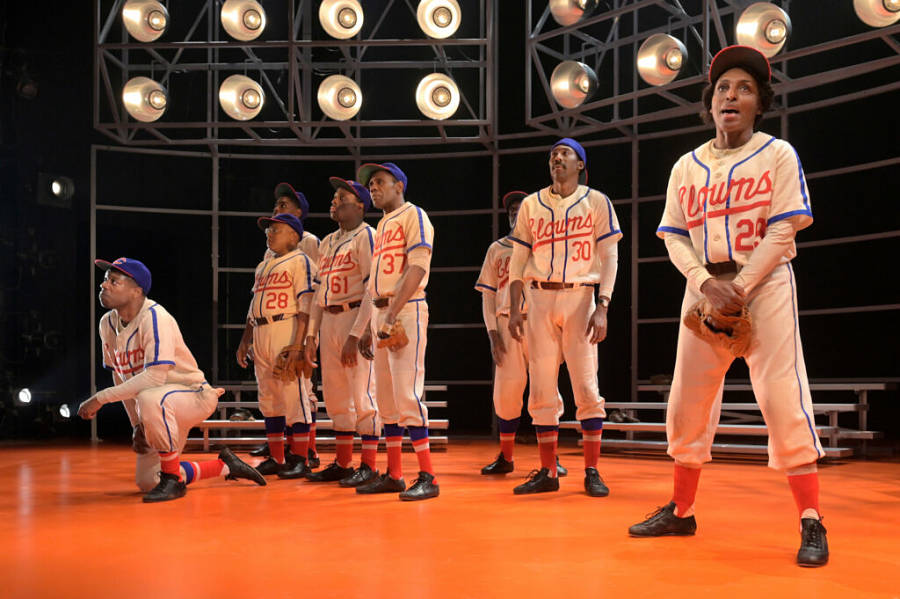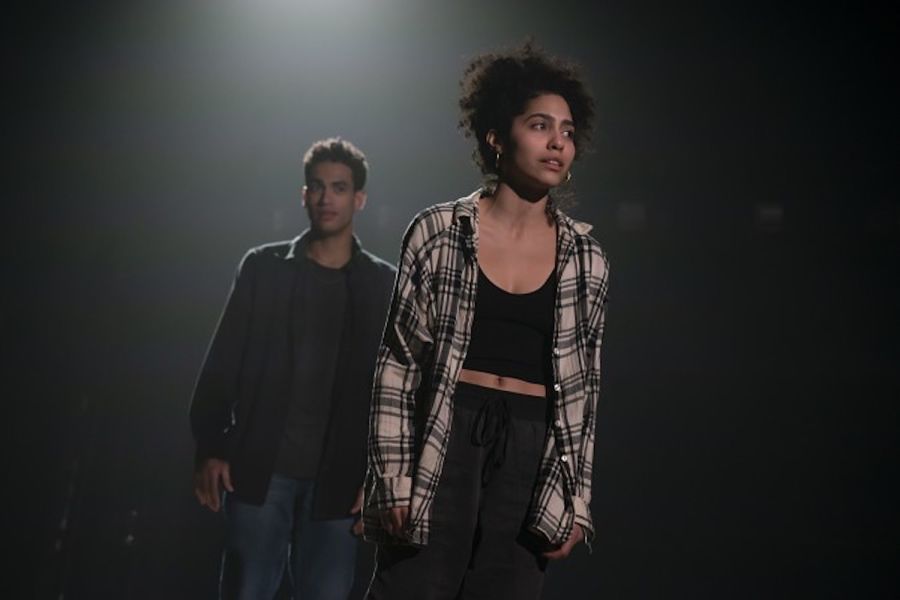On Friday, March 13th—an ominous date—a sparse group of theatregoers filed into the Lucille Lortel Theater in Manhattan to watch the premature closing performance of Martyna Majok’s play Sanctuary City. The crowd of 50 or so claimed designated seats set apart—marked by blue painter’s tape—to encourage social distancing. The previous evening, it was announced that Broadway productions would immediately shutter until April 13, due to the imminent danger of the spread of the coronavirus, and theatres across the country, including almost all Off-Broadway theatres, followed suit.
The presumptive farewell performance of Sanctuary City—which was filmed for posterity—happened long before the show’s scheduled opening date of March 23. (New York Theatre Workshop is postponing programming for 31 days, so it’s possible that the show might have a few days of performance if the COVID-19 situation improves.) Friday’s three-camera video recording might be the only document of the production if it doesn’t return to the stage next month.
“Luckily they were able to do this recording,” said director Rebecca Fracknell after the performance. “I felt really good that we had another chance to do it again. Otherwise, it would have been over and there would have been no sense of closure at all. It’s strange watching a show when you’ve not even opened the show, and now you’re closing it—it’s surreal. I was really glad to get to do it and see it again.”
Majok, who was in a receiving line of hugs with tear-filled cast and crew members filing out of the theatre, said that she was scared for the future of the production. “If there’s not a review, and people haven’t seen it, it’s almost as if it didn’t happen,” she said, noting that she hopes the recording will become available to audiences (there are as yet no plans for that). “Theatre is ephemeral, people gather…but there’s no document. Even after plays go up and close, the only thing left is the review or some sort of writing. I feel like everything is day-by-day, hour-by-hour. Maybe no one will ever see Sanctuary City live again. That would break my heart into 5,000 pieces.”
A recording of the play doesn’t do justice to a project that’s been in development as a piece of live theatre for two and a half years, but it might at least offer audiences a glimpse of the magic the creative team was able to make onstage. “Theatre doesn’t translate that well to film, but I think you can get a sense if something works well,” conceded Fracknell. “Live theatre isn’t meant to be experienced through a screen, but I think it’s brilliant that we had the opportunity to document it.”
In addition to the recording, the cast and crew of Sanctuary City had some closure with an impromptu closing night party they shared with the team of another closed show, Endlings at NYTW. “There was much gin, and wine, and a dance party—I made a 2000s prom playlist on Spotify,” said Majok with a laugh. Beyond Sanctuary City, Majok is mourning the loss of other projects that may not get the chance to be mounted, at least not any time soon: upcoming productions of her play Cost of Living at Round House Theatre in Washington, D.C., and Ironbound at Chicago’s Steep Theatre Company have been pushed back. “It’s been a bad week for artists,” said Majok.

Meanwhile San Francisco’s American Conservatory Theater (A.C.T.) is working to make this bad week a little brighter, at least for ticket-holding theatre patrons. When the mayor of San Francisco banned gatherings of 1,000 people or more last weekend, the theatre set into motion a plan to record and share the current shows in case their productions would also be cancelled. Gloria by Branden Jacobs-Jenkins and Toni Stone by Lydia R. Diamond were captured and will be made available through the BroadwayHD streaming platform.
“We already have the ability through our union agreements to record a full performance, so we did that,” said Jennifer Bielstein, executive director of A.C.T. The company scaled up with additional cameras this time, and in order to get permission to share the recorded previews with ticket buyers, A.C.T. “worked with our union partners and the leadership at Actor’s Equity Association, SDC [Stage Directors and Choreographers Society], and USA [United Scenic Artists],” she said. Part of the union agreement is to pay the actors for the two-week broadcast period.
“BroadwayHD has stepped up and they’re investing in technology on their end to make this all work for us,” said Bielstein. “They will be providing us with links for each of our individual ticket buyers. That will authorize the people who bought tickets to be able to log into the BroadwayHD platform and see the recording of our production. As a bonus, they’re also giving ticket buyers full access to the full BroadwayHD catalog for a full 30 days.”
A.C.T. worked closely with Berkeley Repertory Theatre across the Bay to help move this initiative forward for the larger theatre community. “We’ve been side by side in trying to make this happen for us,” said Bielstein. Berkeley Rep is planning to share Culture Clash (Still) in America, written by Richard Montoya, Ricardo Salinas, and Herbert Siguenza of the Culture Clash troupe, and the company will also record the upcoming production of Jocelyn Bioh’s School Girls; Or, the African Mean Girls Play.
Finding a way to document and share the productions has been a better option than invoking “force majeure right now and sending everybody home,” said Berkeley Rep managing director Susie Medak. For her part Bielstein hopes this viewing opportunity will quell any potential ticket refund requests. “Hopefully, because of the unusual circumstances, they will find this valuable and satisfying in this moment in time,” she said. “We’re excited to be able to offer this to our patrons and I’m very eager to see what their response is after they see it and get to experience the show remotely.”
Theatres across the country are working with unions to find ways to capture, share, and livestream stage work. This weekend, New York City’s La MaMa will partner with CultureHub and HowlRound Theatre Commons to livestream its festival, Re-fest, featuring performances, interviews, discussions, and more. And the production of John Patrick Shanley’s Outside Mullingar at South Coast Repertory in Costa Mesa, Calif., was video-captured during previews and will be available to view despite the theatre’s temporary closure on Friday.
Virtual streaming is one way to share work and record it for posterity, and offer a balm for theatregoers longing for entertainment and a sense of community in an age of medically mandated social distancing. “Everyone—the creative team, the actors, the staff—we’ve all put so much into these shows, and then they’re gone,” said Bielstein. Since keeping the theatres open during a global pandemic isn’t an option, and closure until further notice is “what we need to do,” she added. “We all need to play our part in making sure this virus gets contained so people stay healthy. But it’s hard from an artistic perspective. It’s really, really sad.”
Associate editor Jerald Raymond Pierce contributed reporting for this piece.


